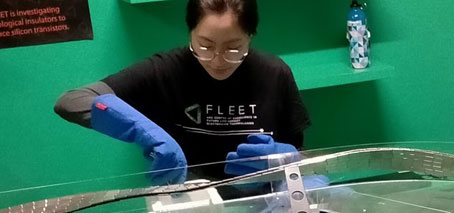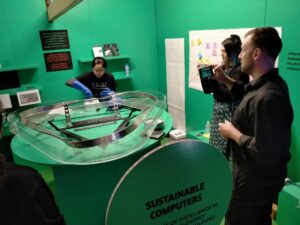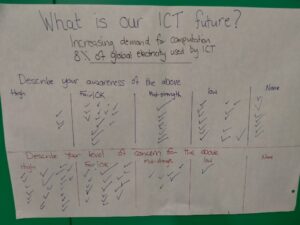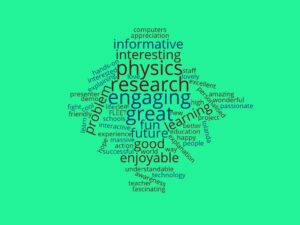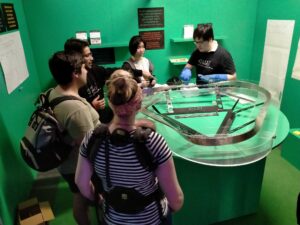
Rishab Mishra (Swinburne) and Yik-Kheng Lee (RMIT) demonstrate FLEET’s popular superconducting mobius strip at Melbourne Knowledge Week
Melbourne Knowledge Week (26 April-2 May 2021) was an opportunity for FLEET to engage with over 350 members of the public about the exciting future of computing, and the vital role of energy-efficient electronics in that future.
FLEET’s sustainable computing booth ran for the full week at the festival hub, with hands-on science demonstrations linked to materials used in FLEET research, such as gallium, bismuth and ferrofluids.
The exercise allowed 15 Centre members from FLEET’s three Melbourne universities the opportunity to gain valuable experience in public science outreach, speaking to a diverse audience.
“Seeing other people’s interest in our work helps remind me of why I’m doing this research and keeps my passion in science alive.” FLEET volunteer
“This type of public outreach helps me become a better communicator, both with the public and with people from other scientific disciplines,” explains FLEET PhD Patjaree Aukarasereenont (RMIT). “Working at the 2021 Melbourne Knowledge Week made me realize I still need to practice a lot, though there were a lot of questions from the public that were more technical than I expected. It is good to know that many people are interested in FLEET research on low-energy electronics.”
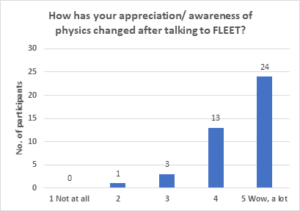
FLEET’s presentations had a positive effect on visitors’ appreciation and awareness of physics, with around 40% commenting on having learned something new.
One of FLEET’s outreach objectives is to get people to think critically about the role and implications of FLEET’s research. FLEET presenters at the MKW booth discussed with public visitors what value they put on computational power…
“For example, technologies underpinning driverless cars, the Internet of Things, artificial intelligence for disease diagnosis and treatment, or a fancier Fitbit,” says FLEET outreach coordinator Jason Major.
“Such computational power comes at a cost, with massive energy demands that have potential implications for the environment and equity. We wanted to discover how people perceive this issue, and what value would they place on FLEET’s search for low-energy electronics that would allow computing to continue to grow.”
Visiting members of the public became aware for the first time of the increasing demand for computation and the associated energy requirements, with one typical comment being “We won’t be able to support our energy demands for our devices in 10 years at the current rate the demand is growing.”
And another: “I’d never thought of the computation-electricity demand problem and how closely related the issue is with my technology needs. It is definitely an eye opener.”
Visitors who worked in computing were particularly interested. For example, a VR visual artist mentioned he’d never considered the consequences of his own work’s high computational demand, realising with some concern that his environmental footprint was ‘massive’, and a data centre worker’s realisation that her role in encouraging more users onto ‘the cloud’ had social and environmental implications.
Significantly, most such conversations between FLEET and members of the public were in-depth, with most conversations being around 10 minutes’ long. Visiting public were surveyed before and after the conversations, to gauge their awareness (low) and concern (high) about ICT energy use, and their appreciation of physics after speaking to FLEET.
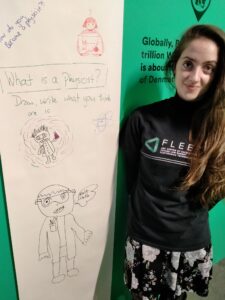
“What does a scientist look like?” FLEET’s Iolanda Di Bernardo (Monash) beside schoolkid’s representations
Such events also help humanise scientists, in particular, exposing schoolkids to working scientists outside the ‘pale, male and stale’ stereotype whose laws they might learn in class.
Research shows that challenging kids’ early gender biases towards professions can influence their future career choices. “Kids can’t be what they can’t see, so we are trying to challenge gender stereotypes in children by demonstrating to them that a scientist can look feminine too,” says FLEET’s Iolanda Di Bernado (Monash).
Melbourne Knowledge Week showcases cool science and engineering projects in the city of Melbourne, connecting non-scientists with the research and technology around them.

